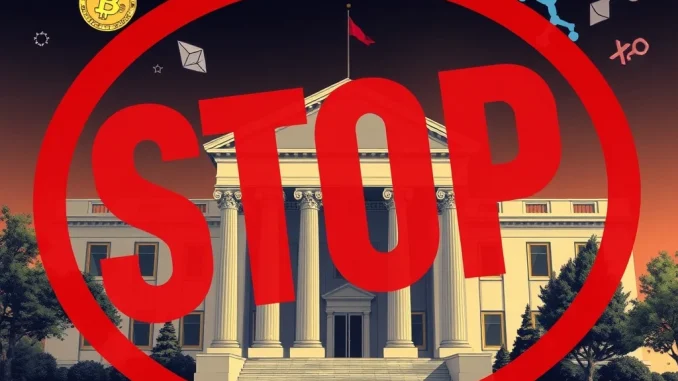
The cryptocurrency world is once again reeling from an unexpected turn of events as the U.S. Securities and Exchange Commission (SEC) delivered a significant blow to the burgeoning Bitcoin ETF market. Just hours after granting what appeared to be a landmark approval, the regulatory body slammed the brakes on Bitwise Asset Management’s highly anticipated crypto index fund ETF, plunging the industry into renewed uncertainty.
The Sudden Halt of the Bitwise Crypto ETF: What Happened?
In a move that has left many scratching their heads, the SEC initially approved Bitwise Asset Management’s crypto index fund ETF, only to halt its launch mere hours later. This unexpected reversal was executed under Rule 431(e) of the Securities Act, a provision allowing the agency to pause decisions for further review. The decision immediately drew scrutiny, highlighting concerns about the SEC’s approach to crypto products and its inconsistent application of oversight standards.
The Bitwise ETF, specifically the Bitwise 10 Crypto Index Fund, had received its approval on July 16, 2025. It was designed to offer investors exposure to the 10 largest cryptocurrencies by market capitalization, providing a diversified entry point into the digital asset space. Here’s a quick look at its composition:
- Bitcoin (BTC): 78.72%
- Ethereum (ETH): 11.10%
- XRP: 4.97%
- Solana (SOL), Polkadot (DOT), and others: Remaining percentage
The fund’s portfolio was set to rebalance monthly to align with the index, with Coinbase Custody securing the crypto assets and BNY Mellon managing cash and serving as the fund administrator. Despite these robust structural details, the SEC’s reversal has left the product in limbo, delaying its potential listing on a national exchange and limiting accessibility for both retail and institutional investors.
Why is the SEC’s Crypto Regulation Causing Such Uncertainty?
This isn’t an isolated incident. The regulatory pause mirrors a similar action against Grayscale’s Digital Large Cap Fund, which also faced approval followed by a halt for further review. Both funds share common holdings like Bitcoin, Ethereum, and Solana, highlighting a pattern of scrutiny despite meeting standard approval criteria. This recurring theme raises significant questions about the consistency of crypto regulation in the U.S.
Analysts suggest that internal divisions within the SEC may be influencing these decisions. Concerns about broad crypto exposure and underlying political dynamics could be playing a role in the agency’s seemingly contradictory actions. The SEC’s inconsistent messaging—rapidly granting and then rescinding approvals—has led to questions about its capacity to balance market innovation with investor protection. This back-and-forth creates a challenging environment for market participants seeking clear guidelines.
Navigating the Complex Bitcoin ETF Landscape
The broader Bitcoin ETF landscape remains in flux as the SEC reviews additional proposals. These include funds tracking tokens like Solana and Dogecoin (DOGE). The persistent delays indicate a cautious stance toward normalizing such products within traditional financial markets. For market participants, this translates to heightened uncertainty, as the agency’s procedural interventions—such as granting and rescinding approvals—underscore the urgent need for a more transparent regulatory framework.
Without clear guidance, investors may redirect capital to jurisdictions with more predictable rules, further complicating the U.S. market’s ability to compete on a global scale. The lack of a stable regulatory environment not only deters innovation but also potentially pushes legitimate financial activity offshore, where rules might be clearer, even if less stringent.
The SEC’s Dual Role: Market Actor or Regulator?
This incident underscores the SEC’s complex dual role as both a market actor and regulator. While the agency has historically opposed spot crypto ETFs, its rapid reversal of Bitwise’s approval suggests a lack of policy coherence. The pause reinforces perceptions of a two-tiered system, where institutional-grade products might face less scrutiny than offerings designed for broader retail access.
The implications for the broader crypto market are significant. The unpredictability from the SEC crypto oversight can stifle innovation and deter investment in the U.S. digital asset space. As the SEC continues its review, the industry awaits a framework that addresses regulatory concerns without stifling innovation. A clear, consistent, and predictable regulatory path is essential for the long-term growth and stability of the cryptocurrency market in the United States.
Conclusion
The SEC’s abrupt halt of the Bitwise Crypto ETF launch, citing Rule 431(e), serves as a stark reminder of the volatile and unpredictable regulatory environment surrounding cryptocurrencies in the United States. This decision, following a pattern of inconsistent actions, casts a shadow of uncertainty over the future of crypto-related financial products. As the industry grapples with these challenges, the call for a clear, consistent, and transparent regulatory framework becomes louder than ever. Only with such clarity can the U.S. truly foster innovation while ensuring investor protection in the rapidly evolving digital asset landscape.
Frequently Asked Questions (FAQs)
Q1: What exactly happened with the Bitwise Crypto ETF?
The SEC initially approved Bitwise Asset Management’s crypto index fund ETF, but then halted its launch just hours later. This action was taken under Rule 431(e) of the Securities Act, allowing the agency to pause decisions for further review.
Q2: What is Rule 431(e) and why was it cited?
Rule 431(e) of the Securities Act grants the SEC the authority to suspend the effectiveness of a registration statement, allowing them to pause a decision for further review. It was cited to halt the Bitwise ETF launch, indicating the SEC felt more scrutiny was needed despite initial approval.
Q3: How does this incident affect the broader Bitcoin ETF market and other crypto applications?
This incident creates heightened uncertainty for the entire crypto ETF landscape, including other proposed funds tracking tokens like Solana and Dogecoin. It suggests a cautious stance from the SEC and may lead to further delays or rejections, potentially redirecting capital to jurisdictions with clearer regulatory frameworks.
Q4: Why is the SEC’s approach to crypto regulation considered inconsistent?
The SEC’s approach is seen as inconsistent because it has rapidly granted and then rescinded approvals for crypto products, as seen with both Bitwise and Grayscale’s Digital Large Cap Fund. This back-and-forth suggests internal divisions or a lack of clear policy coherence, making it difficult for the market to predict regulatory outcomes.
Q5: What are the main holdings of the Bitwise 10 Crypto Index Fund?
The Bitwise 10 Crypto Index Fund is designed to hold the 10 largest cryptocurrencies by market capitalization. Its primary holdings include Bitcoin (BTC) at 78.72%, Ethereum (ETH) at 11.10%, and XRP at 4.97%. It also includes smaller allocations to assets like Solana (SOL) and Polkadot (DOT).
Q6: What does this mean for investors interested in crypto ETFs?
For investors, this means continued uncertainty regarding the accessibility of crypto ETFs in the U.S. While the long-term outlook for such products remains, the immediate future is unpredictable. Investors may need to consider alternative investment avenues or look towards jurisdictions with more established and predictable crypto regulatory frameworks.



